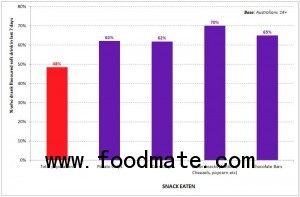Roy Morgan research revealed that 42 per cent of Australians (or 8.2 million people) eat potato chips every week. This time last year 41 per cent of the population included potato chips as part of their weekly diet.
In bad news for Australia’s waist lines, Roy Morgan Research also found that 62 per cent of those who eat potato-chips weekly also drink some kind of soft-drink within the same period. Australians who eat other kinds of salty snacks like Cheezels, popcorn and corn chips were generally found to drink soft drink within the same week also.

“The news that potato crisps are still Australia’s favourite snack, eaten by more than 8 million people in an average seven days, can be seen as somewhat concerning from a health perspective – especially when sugary soft drinks are also part of the dietary equation,” said Andrew Price, General Manager of Consumer Products at Roy Morgan Research.
“While it’s true that snack-food brands have made the effort to introduce low-salt and/or diet variations to their product ranges, these have not proven as popular as the originals. In fact, our findings show that people who snack on crisps, corn chips and the like are less likely than the average Aussie to agree with health statements such as ‘I always think of the number of calories in the food I’m eating’, ‘A low-fat diet is a way of life for me’ and ‘I restrict how much I eat of fattening foods’,” said Price.
“Not surprisingly, given this relaxed attitude to health issues, it’s young men and women under 25 who tend to be the most avid consumers of these salty snacks. Consumption only really drops off among the over-50s, an age when one’s health inevitably becomes more of a preoccupation,” Price said.
“It’s a complex situation. On one hand, snack food and soft drinks regularly attract negative media scrutiny for their less-than-nutritious qualities; and on the other, their popularity is impossible to deny. To ensure their continued success, manufacturers of these products must remain alert to any shifting attitudes that could affect how Australian consumers see and consume their favourite snacks — and with the help of Roy Morgan Research’s in-depth consumer profiles, they can do just that,” Price said.
“While it’s true that snack-food brands have made the effort to introduce low-salt and/or diet variations to their product ranges, these have not proven as popular as the originals. In fact, our findings show that people who snack on crisps, corn chips and the like are less likely than the average Aussie to agree with health statements such as ‘I always think of the number of calories in the food I’m eating’, ‘A low-fat diet is a way of life for me’ and ‘I restrict how much I eat of fattening foods’,” said Price.
“Not surprisingly, given this relaxed attitude to health issues, it’s young men and women under 25 who tend to be the most avid consumers of these salty snacks. Consumption only really drops off among the over-50s, an age when one’s health inevitably becomes more of a preoccupation,” Price said.
“It’s a complex situation. On one hand, snack food and soft drinks regularly attract negative media scrutiny for their less-than-nutritious qualities; and on the other, their popularity is impossible to deny. To ensure their continued success, manufacturers of these products must remain alert to any shifting attitudes that could affect how Australian consumers see and consume their favourite snacks — and with the help of Roy Morgan Research’s in-depth consumer profiles, they can do just that,” Price said.





